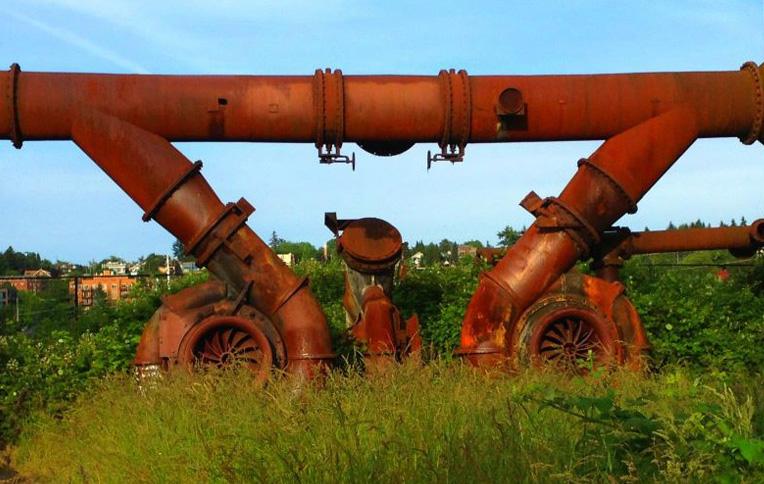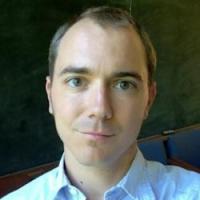
When nature has been identified in the city, it is largely recognized in the parks and gardens, in other words in the greenness of the grass, shrubs, and trees. Nature is rarely acknowledged in the stormwater that runs down the streets and into the sewer, the wind that blows through the urban canyons, or the weeds that grow in the cracks of the sidewalk.
The National Endowment for the Humanities has awarded nearly $180,000 for a new summer institute on the urban environment at the Simpson Center for the Humanities at the University of Washington.
The institute, City/Nature: Urban Environmental Humanities, examines how Western cultures have historically viewed city and nature as separate—and how a more integrative understanding can serve an increasingly urbanized world. It uses Seattle’s complex environmental history as a window into broader questions of global justice and health.
Urban landscape historian Thaisa Way, urban ecologist Ken Yocom, and literary scholar Richard Watts will lead the institute, which includes field trips along with literary readings and discussions, public lectures, dinner conversations, and dedicated research time. They will assemble a diverse cohort of 25 faculty from two-year and four-year colleges and universities nationwide. Application information will be available in fall 2016, and the institute runs from June 26 to July 14, 2017.
The course recognizes that the humanities offer tools for thinking about climate change, poverty, political injustice, and other wicked problems that converge in 21st-century cities.
“Nature and the city—or culture and the natural world—have, for centuries, been cast as opposites,” said Way. “An intellectual and a perceptual rift suggesting that cities are separate from the natural world is persistent both among scholars and in the public imagination.
“When nature has been identified in the city, it is largely recognized in the parks and gardens, in other words in the greenness of the grass, shrubs, and trees. Nature is rarely acknowledged in the stormwater that runs down the streets and into the sewer, the wind that blows through the urban canyons, or the weeds that grow in the cracks of the sidewalk.”
Undoing the city-nature dichotomy has been a fertile project for the field of environmental humanities. Course readings and guests will include scholars who have demonstrated integrative thinking and research.
“By pushing the boundaries of scholarship and teaching in the urban environmental humanities, participants will contribute to a more robust reading of the impact of an increasingly urban world that is facing significant environmental changes,” said Way.
Field trips will visit the Brightwater Sewage Treatment Center, downtown Seattle (built on former marshes), Gas Works Park, and a Superfund site on the Duwamish River.
“These site visits force us to confront the coexistence of built and natural environments at the city's core,” said Way.
Way, Associate Professor of Landscape Architecture, brings a history of leading complex, discipline-spanning projects. She directs the Urban@UW initiative launched in 2015 and co-leads the Lake Union Laboratory collaboratory research project. She also co-led, with Margaret O’Mara (History), an intensive, year-long Sawyer Seminar, “Now Urbanism: City Building in the 21st Century and Beyond,” underwritten by a grant from the Mellon Foundation, at the Simpson Center.
Watts, Chair & Associate Professor of French & Italian Studies, is a literary scholar who approaches the texts of former French colonies through the lens of the environmental humanities. His recent work examines water in the urban contexts of Fort-de-France, Port-au-Prince, Dakar, Algiers, and Ho-Chi-Minh City. In 2013, he co-organized the 2013 conference The Future of the Environmental Humanities: Research, Pedagogies, Institutions, and Publics at the UW.
Yocom, Associate Professor of Landscape Architecture, brings the perspective of a scientist and urban designer. He has taught a field course, “Reading the Elwha,” that tracks the ecological and cultural shifts created by the largest dam removal in US history. He is co-editor of Now Urbanism: The Future City is Here (Routledge, 2015).
UW guest speakers will include María Elena García (Comparative History of Ideas), Anne C. Huppert (Architecture), Linda Nash (History), and Sarah Culpepper Stroup (Classics). Additional visiting guest speakers will give lectures that are open to the public.
Participants will receive a $2,700 stipend to attend. An application process will begin in the fall, with a deadline of March 1, 2017.
Related
- The Anthropocene crossdisciplinary research cluster, a 2016-17 project of the Simpson Center
- Environmental Humanities graduate research cluster
- Urban@UW, gathering urban studies activities at the UW
